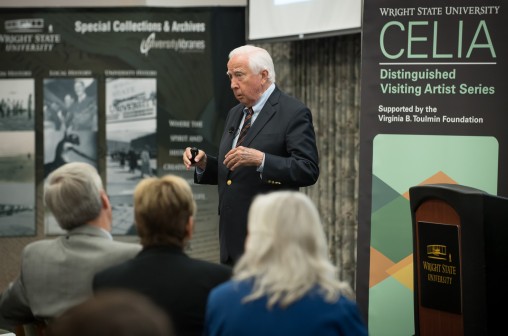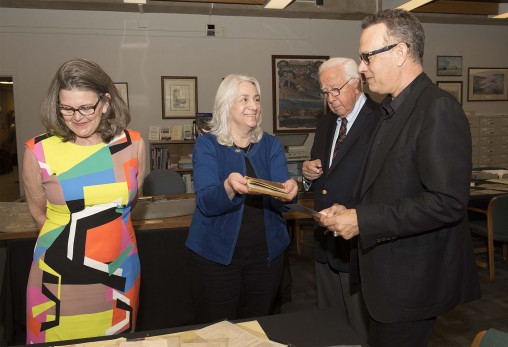
Pulitzer Prize-winning author David McCullough discussed the Wright brothers’ legacy during a master class at Wright State April 19. McCullough’s visit to Dayton coincided with Tom Hanks’ visit to dedicate the Tom Hanks Center for Motion Pictures. (Photo by Erin Pence)
Story contributed by Timothy R. Gaffney, National Aviation Heritage Alliance
In nearly five years of research for his bestselling book “The Wright Brothers,” David McCullough came to know the brothers Wilbur and Orville Wright more closely than he knew his closest friends.
He did it by being a snoop.
In a distinguished career of writing historical narratives such as “Truman,” “John Adams” — both of which earned him the Pulitzer Prize for biography — and, last year, “The Wright Brothers,” McCullough was able to play peeping tom on some of the great figures of history, he told a master class at Wright State University on April 19 in the Student Union’s Endeavour Room.
“I’ve been keeping company with a lot of impressive people in my years writing books, and if you spend three, four, five, as many as 10 years with someone you never knew and has long passed from the scene, you get to know that person very well in many ways, better than you know people in real life. Because in real life you don’t get to read other people’s mail,” he said.
Fortunately for historians and writers like McCullough, the Wright brothers were talented and prolific writers.
“The letters the Wright brothers wrote in private correspondence, within the family almost entirely, number over a thousand in the Library of Congress. And none of them — none of the four, the father (Bishop Milton Wright), the sister Katharine and the two brothers — were capable of writing a short letter or a boring one. They were absolutely superbly written. We can go into their lives in a way that we can’t normally,” McCullough told the class.
Many more papers survive in the Wright State University Libraries’ Special Collections and Archives. McCullough frequented both collections in his research.
McCullough, born and raised in Pittsburgh and now living in Boston, returned to Wright State this week as actor-filmmaker Tom Hanks was visiting the campus to dedicated the Tom Hanks Center for Motion Pictures and take part in a fundraising gala for Rise. Shine. the Campaign for Wright State University. McCullough and Hanks visited other sites related to the Wright family during their visits to Dayton.

Dawne Dewey, head of Special Collections and Archives at Wright State, showed items from the university’s “Wright Brothers Collection” to David McCullough, Tom Hanks and Amanda Wright Lane, great-grandniece of the Wright brothers. (Photo by Will Jones)
During their visit to campus, Hanks and McCullough toured the archives and examined rare Wright artifacts that are part of the university’s “Wright Brothers Collection,” one of the most complete collections of Wright material in the world. The collection includes the Wrights’ own technical and personal library, family papers and other documents detailing the lives and work of Wilbur and Orville Wright and the Wright family.
In his master class, McCullough, who holds a degree in English literature from Yale University, made a case for the humanities and used the Wright brothers as evidence.
“One of the joys of my work on the Wright brothers was to realize that these two men, who cracked one of the most difficult, if not the most difficult problems of all time, had only an education in the humanities. And they got it at home,” he said.
The Wright family home at 7 Hawthorn Street in what is now the Wright-Dunbar neighborhood was small and simple, but it had a library stocked with the classics of literature, philosophy and science. Their father emphasized the importance of English and writing, McCullough said.
“And so when one reads the letters that they wrote, which they wrote in great quantity, you’re struck right away not only by how correct the English is grammatically, but how effectively they wrote and the breadth and variety of their vocabulary,” McCullough said. “We think with words. And if our vocabularies are declining, which they are, that’s not a healthy sign. So I hope one can take an example of the Wright brothers, if you’re embarking on an education, as we are all our lives, or should be, to read. And to read the works of literature that have survived the test of time. And to read with the sense of finding fulfillment in what we read.”
The Wright family letters are important in helping us know Wilbur and Orville not only for what they did, but who they were, McCullough said. And understanding how individuals change history requires understanding how they live, he said.
“I think the Wright brothers are a lesson in history if ever there was,” McCullough said — not just in their invention of the airplane, “but how they went about their pursuit of purpose and dedication they brought to their work, and the fact that they did not let failure defeat them. They could get knocked down, and they did in many ways, but they always got back up again and they always learned from their mistakes or their failures.”
At the close of the 19th century, Wilbur and Orville began attacking the problem of flight, and by the end of 1903 they made the first controlled, powered flight in a heavier-than-air machine. By the end of 1909 they were selling airplane in the United States and Europe, and by the end of 1910 they had erected the first American factory for airplane manufacturing.
McCullough used the Wright brothers to underscore how individuals can change history and why it’s important to know them.
“They changed the world. Changed history. Who were they? And how many times have we been flying at 35, 40,000 feet at 500, 600 miles an hour thinking nothing of it?” he asked rhetorically. “Who did it, and why in the world aren’t they better known, and why weren’t we told more about them, and what kind of people they were, and what kind of values they had, and what we can learn from them by not just what they accomplished, but how they conducted themselves in life and in their community?”

 Wright State alum Lindsay Aitchison fulfills childhood space-agency dream
Wright State alum Lindsay Aitchison fulfills childhood space-agency dream  Wright State business professor, alumnus honored by regional technology organizations
Wright State business professor, alumnus honored by regional technology organizations  Wright State University Foundation awards 11 Students First Fund projects
Wright State University Foundation awards 11 Students First Fund projects  Gov. DeWine reappoints Board Treasurer Beth Ferris and names student Ella Vaught to Wright State Board of Trustees
Gov. DeWine reappoints Board Treasurer Beth Ferris and names student Ella Vaught to Wright State Board of Trustees  Joe Gruenberg’s 40-Year support for Wright State celebrated with Honorary Alumnus Award
Joe Gruenberg’s 40-Year support for Wright State celebrated with Honorary Alumnus Award 